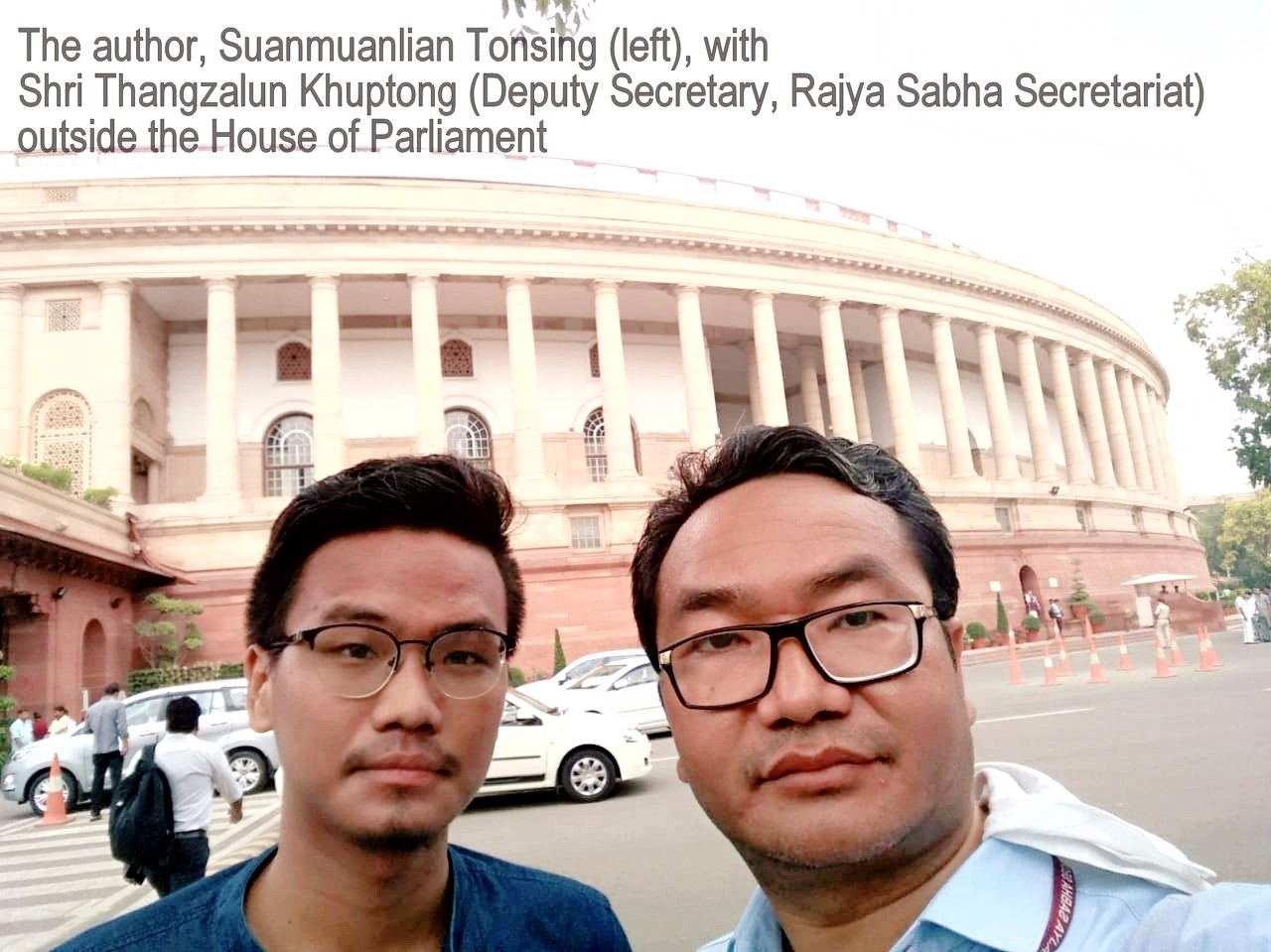A DAY AT THE UNION BUDGET SESSION (5th July 2019)
Suanmuanlian Tonsing
Research Scholar
Development is not Progress
Kept repeating on my mind during the entire Budget Session. Seated on one of the corners of the Public Gallery, the view was quite enthralling for me to establish a perspective that lay in front of me. From the distance, I could see Smt. Sonia Gandhi and Shri Rahul Gandhi sitting on the front row of the opposition. In the exact opposite of the opposition benches Shri Narendra Modi and Shri Rajnath Singh were sitting adjacent to each other on the first line of the ruling benches. The state apparatus could be seen in different forms: the securities and the employees (who could not stop to amuse me by their commitment to the state’s interests and normalization), media persons, etc.
Micro-level: Actors and Audience Well inside the Parliament, one could see and observe what they seek in different alternatives, depending on what they came for. But I came for something of my own personal interests.
I was privileged enough to get this opportunity by getting recommendation from Mizoram MP Shri C Lalrosanga MNF party, which was all possible due to the arrangement made by Shri Thangzalun Khuptong (Deputy Secretary, Rajya Sabha Secretariat, Parliament of India) whose kind, generous and affirmative support will never be repayable. As I was saying, I went for the session with a ‘lens’ in me, an abstract lens, of course as I had something else on my mind. The experiences I encountered with the help of the abstract lens make me understood that I was in an arena where two groups with differing ideologies (both comprising of certain ethnies and religions) were in a position to perform some meaningful social actions. And these two groups were said to represent the interest of the people, according to the democratic framework.
Somewhere around 11:05 Am, the finance Minister Smt. Nirmala Satharaman blasts off the session with remarks to the ruling government for its achievements in the past term in her early speeches. As usual the ruling parties perform what they were determined to do- bang on the desks! I cannot agree more to myself on my thoughts at that juncture- that’s a hard slap on the face of the opposition. The social actions that took place were significantly worth observing! Each and every movement, speech and reaction has its own specific meaning. For instance, the meaning behind the banging of desks by the opposition differs from the ruling parties who bang at the desks at almost every budget being listed. The action of mere ‘silence’ also attributes to something.
The irony, however, is this. I sat at the public gallery observing ‘my’ representatives in the parliament. But my interests did not seem to be represented, and yet I did not have the right to speak of my likes or dislikes on the listed budgets, even after the formal presentation from the representatives. The only social action that I can perform is to sit, watch or observe. Or so, the only beautiful meaning which I could have produced during that time is to ‘leave’ the session to show my disdain towards my representatives, but again, that won’t make any sense. The state apparatus in the form of security guards, employees and the like are in-convincingly strong to attend to the interest of the state, that it forgot the interest of the ‘public’ present there.
As explicitly observable as it is, along with the progress of the session, some members from the ruling party did not ‘seem’ to be pleased with the listed budgets, as I did not see representatives like, for instance, Shri Kiren Rijiju making any significant meaning through his actions during the entire session, unlike his other colleagues whose actions were none other than banging around the desk with dignity. And Yes, as a reminder Shri Kiren Rijuju is from Northeast India. Why do I mention this? What could be the premises and the inference derived from his non-expression or unusual expression of social actions? Are there internal conflicts within the state machinery? All I can say is there was no specific mention of any overwhelming developmental project for people living in the Northeast! You never know what is going on inside the state, what is happening within the state stays with the state. What Philip Abrams (in his article Notes on difficulty of studying the State) argues on the challenge of studying or researching the state, turns out to be extremely true here.
Macro-level: Representatives for whom?

Are the representatives representing the ‘public’ or are they representing for themselves? This sort of session leads me to recall the celebrated term called Oligarchy (the rule of the few). Yes, I have significantly witnessed Oligarchy in ‘live’ stream (if I may use contemporary communicative discourse). In a democratic space like India, democracy can only be upheld when the voices of the minorities are being heard. The Budget session seemed to have mis-heard the voices of the minorities. Here, by minorities, I mean no specific community or groups. I simply mean to address those at the lower rung of the society, the subalterns, the marginalised, etc., who are never heard or properly represented. Can the government justify that the people in the lower rungs (for instance, construction of houses in rural areas) are satisfied with materialistic accommodation of over 1.5 crore houses which it proudly claimed to have achieved through Pradhan Mantri Awas Yojana Gramin during their term 2014-18? Is construction of 1.5 crore houses sufficient when 1.5 crore represents only 6% of the total rural household in India? (according to Census of India 2011, there are 22.1 crore rural household). What about the other remaining 94 %? Do these constructions come with proper road connections, transport facilities, water facilities, etc? All these frameworks of the Union budget comes from the few elites who have not experienced poverty but are poverty ‘experts’, who have not experienced ‘homelessness’ but are expert in ‘slum areas’, etc. The government is essentially playing with numbers.
But one thing that amuses me was the way the capitalistic means of production is masked/hidden within the framework of the budget itself. In fact, it is masked by several numbers of the budgets. To mention only one, the project which amuses me is ‘Gandhipedia’, an online encyclopedia, which will be developed by National Council for Science Museums and will be jointly implemented by IIT-Kharagpur and IIT-Gandhinagar. While the extreme idea of capitalism was laid out in plain sight, the government has diverted the Capitalistic agenda from the population by introducing plans on ‘Gandhipedia’. How so? Gandhipedia is supposed to ease and mild down the manifestation of capitalism. If you look deeper, it gives a sense of ‘Nationalism’ being hidden within Gandhipedia. While this diverts all the capitalistic implications which the government is undertaking, such as extended connection between the Public and private sectors, Corporate bodies, etc, the government also strengthens the ‘Nationalistic ideology’ through Gandhipedia. I could feel a charge of emotions and the arousal of primordial attachments through usage of terms like ‘New India’ by the Finance Minister during the Budget session. These representatives are, after all, representing for development, and not for progress. And it struck me as to how far they are aware of the dangers of development without progress (example displacement due to dam Construction, eviction of forest dwellers, and so on).
The Truth
As understood, according to Easterlin Paradox concept, economic growth does not essentially mean the income or the position of the poor are uplifted or they are happy. This is just the continuation of expansion of the capitalist industries or production. What the elites in the ruling government are doing is nothing but the detachment of itself from the public interest, further attaching the so called ‘development’ with the public. Such development always comes at the cost of the public. The session I have experienced is non-other than a session of the capitalist ideologue infringed, intertwined and mixed with a latent feeling of nationalism which can outburst any time, if charged in a specific manner. As I retreat myself away from the Public Gallery, towards the exit door, I could only think of nothing, except the fear as a minority in this country. Hence, my thoughts revolve around the question Is the government essentially thinking through to conduct its governance with Nationalistic propaganda with the mixture of capitalistic ideology in the name of development which may disintegrate the country further?
----------------------------------------------------------------------------------------------------------------
(N.B.: All the thoughts expressed here are authentic to the author and does not reflect the thoughts of any personalities who are mentioned in the article)
*The author is a Research Scholar in Department of sociology, Delhi School of Economics under University of Delhi.
Contact details:
fb/instagram: Muanlian Tonsing
email: This email address is being protected from spambots. You need JavaScript enabled to view it.
----------------------------------------------------------------------------------------------------------------------
Suggested Readings
Abrams, Philips.(1988). Notes on Difficulty of Studying the State. Journal of Historical
Sociology, 1(1): 58-89
Harman, Chris (1991). The state and capitalism today. From International Socialism, 2 (51): 3–57.
Poulantza, Nicos.1969. The Problem of the Capitalist State. New Left Review, 5. Retrieved from https://ssc.wisc.edu/~wright/Soc924-2011/Poulantzas%20- %20the%20problem%20of%20the%20capitalist%20state.pdf
.

